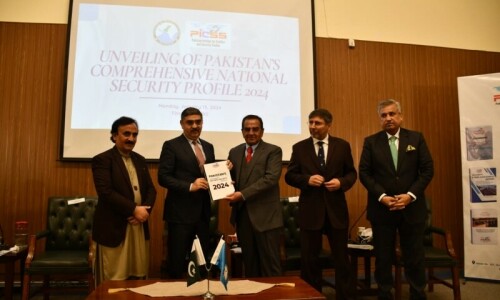ISLAMABAD: The government on Tuesday put on record that it had reached an agreement with bagasse-based power plants for tariff cuts and would take four to six months to revise power purchase agreements (PPAs) with 18 other independent power producers (IPPs) set up under 1994 and 2002 power policies.
With the approval of the federal cabinet last month, Power Minister Owais Khan Leghari announced the pre-mature termination of PPAs with the five oldest IPPs, with annual savings of Rs70 billion (71 paise per unit) or around Rs411bn over the remaining term of their contracts.
However, testifying before the Senate Standing Committee on Power, Prime Minister’s Special Assistant Muhammad Ali, who is also a member of the task force on renegotiations with IPPs, said the savings out of those five oldest IPPs would be around Rs60bn per annum. Senator Mohsin Aziz presided over the meeting of the committee.
Mr Ali said the ongoing negotiations with IPPs were part of the reforms to stabilise the power sector and help industrial and commercial activities to pick up. He said the agreements with five IPPs had been signed last month with the federal cabinet’s approval.
Deals with five bagasse-based plants to save Rs60bn annually
In the second round, he said, the negotiations had been completed with bagasse-based IPPs for delinking their international coal-based pricing indexed to the US dollar.
Their dollar indexation has now been withdrawn and replaced with Pakistani rupee. He said a formal summary had been sent to the federal cabinet for formal approval of these changes to the IPPs set up by sugar mills on cane residue, called bagasse.
Mr Ali told the committee that nowhere in the world did bagasse-based power generation have any linkage to coal prices and that, too, in dollars. The renegotiations with IPPs of sugar mills had now been aligned to the tariff structures in other countries.
He said this was part of the government strategy to increase reliance on local fuels and reduce dependence on imported fuels that were subject to fluctuations in the global markets, resulting in foreign exchange outflow.
Mr Ali said the ever-increasing and unaffordable energy costs led the government in 2019 to examine IPPs contracts and tariffs as many of them were earning returns going beyond 27 to 30pc as the 1994 power policy offered upfront tariffs and the 2002 policy provided equity-based returns linked to exchange rate despite being a local investment.
Also, the National Electric Power Regulatory Authority could not get their heat rate and efficiency tests for tariff calculations as the IPPs secured court stay orders.
Senator Mohsin Aziz lamented that the investment made by IPPs in the installation of power plants was recovered by sponsors in about four years, while some coal-based plants were able to redeem their whole investments in two years.
Mr Ali said approximately 13 to 17pc returns were given to these IPPs in Pakistan, twice those offered in any other country. He said the government should step back from the power business and focus on developing power markets, as practised in other countries.
He said the task force was currently in the third phase of negotiations with 18 IPPs from 1994 and 2002, as well as the state-owned power plants. “The negotiations will be completed in the next three to six months”, he said.
Mr Aziz and other members of the committee appreciated the efforts of the task force to secure savings from IPPs through negotiations. They suggested that this should now ease the burden on the masses.
The committee also discussed an issue raised by Senator Aimal Wali Khan regarding the inclusion of IPP costs in the electricity bills by Peshawar Electric Supply Company in Khyber Pakhtunkhwa, despite not a single unit of electricity being produced by IPPs in the province.
Special Secretary Arshad Majeed Mohmand told the panel that the price of electricity was determined by the federal government based on various sources of energy and that the power tariff was uniform across the country.
The committee was of the view that provinces should be given the benefit of their indigenous resources.
Published in Dawn, November 6th, 2024














































Dear visitor, the comments section is undergoing an overhaul and will return soon.